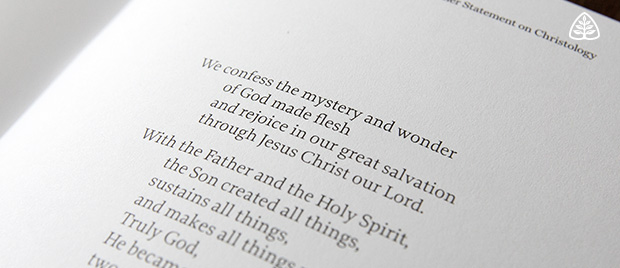Why a Statement on Christ Matters Now

In the university town of Oxford, England, stands a monument to Reformation martyrs, who, as the inscription reads:
Yielded their bodies to be burned, bearing witness to the sacred truths, which they had affirmed and maintained against the errors of the Church of Rome, and rejoicing that to them it was given not only to believe in Christ, but also to suffer for His sake.
Do you see the key verbs here? They affirmed and maintained true and biblically faithful doctrine. These martyrs were theologians and pastors. They taught and defended the truths of the Word of God. Chief among those truths are the Reformation slogans of solus Christus (Christ alone), sola fide (faith alone), and sola gratia (grace alone). These Reformation truths summarize core doctrines concerning the person and work of Christ. They summarize the gospel.
The Reformation martyrs also rejoiced. They rejoiced that they were counted worthy to suffer for Christ. That is theological commitment. We are moving into uncharted waters in most of the Western world. We are living in a post-Christian era, as many have pointed out. There is an urgency today that is almost palpable. It is an urgency that requires theological commitment.
Our post-Christian era is an era of confusion. It is also an era of the rise of Islam on the one hand and the rise of the “nones” on the other—the nones being those who are entirely religiously unaffiliated. It is an era of pluralism, of many voices that affirm many truths; some may pretend not to care about truth at all. This confusion can be found both outside and inside of the church.
In times of confusion, we need clarity and conviction. To that end, Ligonier has released The Word Made Flesh: The Ligonier Statement on Christology. The first line of the statement declares:
We confess the mystery and wonder
of God made flesh
and rejoice in our great salvation
through Jesus Christ our Lord.
There are two key topics here. First is the person of Christ and the doctrine of the incarnation. Jesus is “Immanuel,” which means “God with us” (Matt. 1:23). He is the God-man. The word incarnation literally means “to take on flesh.” This is indeed a mystery and wonder. Mystery causes us to be humble, to submit. Wonder causes us to stand in awe, to be astonished. Both mystery and wonder cause us to adore and worship.
The second key topic here is the work of Christ. Christ accomplished our great salvation. As the God-man, He alone can save. In a world of many voices and in a sea of religious pluralism, Christ alone is the way, the truth, and the life (John 14:6). The Ligonier Statement on Christology and the accompanying Twenty-Five Articles of Affirmation and Denial elaborate upon and explore the rich contours of these two topics: the person and work of Christ.
There are also two key verbs in these opening lines. The first is confess. It is a Latin word. It means “to declare with.” When we confess something, we are declaring with someone. If I confess to a crime, I’m declaring with the authorities (or with the evidence) regarding my guilt. If I confess a belief, I am declaring with the authorities regarding my belief. We are declaring with each other our mutually held beliefs. As a Christian church, we together confess Christ. But here’s an astounding thought. When we confess, we are actually declaring with God; we are avowing what He has revealed about Himself in His Word. When we say, “We confess . . . ,” what comes next must be absolutely true and sure and solid.
This is theological commitment. Only a belief worth dying for—and living for, too—is worth confessing.
The second key verb in the opening lines of the Ligonier Statement on Christology is rejoice. Dr. R.C. Sproul likes to say that theology sings. Or, rather, he says good theology sings. These beliefs are far more than intellectual affirmations. They set the heart on fire and they set the life to action. When good theology is declared, the tongue is loosed and desires respond.
Rejoice is a compound word. The re- in rejoice is what linguists call an intensive. It intensifies the action of the word it is joined to, in this case, joy. Rejoice means to be full of joy, or even to cause joy. Joy upon joy.
How could those Reformation martyrs rejoice in suffering, rejoice in their martyrdom? The answer is Christ. They had a laser-like focus on Christ and on Him crucified. That focus provided perspective for all aspects of their lives, and even for their deaths. Such was the depth and breadth of their theological commitment.
“We confess the mystery and wonder of God made flesh and rejoice in our great salvation through Jesus Christ our Lord.” This is our theological commitment. And this is why a statement on Christ matters now.
Read, share, and download the statement in multiple languages at ChristologyStatement.com or click the links below:
This article is part of The Ligonier Statement on Christology collection.